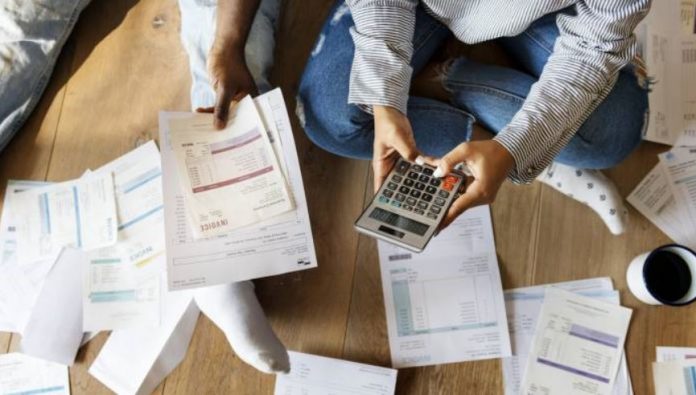Debt is a basic fact of life for most people – and honestly, that’s usually not much of a problem. Everything from credit cards and student loans to decades-long mortgages are day-to-day realities all across the UK. As long as your debts are under control, you’re probably fine most of the time.
However, there are definitely times when debts start to mount up – and that’s where they can begin to be a problem for more than just your wallet. Debt is a key source of stress, depression and anxiety for many people. The key thing to remember is that you’re not as alone or helpless as you think you are. There are resources out there to help you. Perhaps more importantly, there are ways of making sure your debts never spiral out of control in the first place.
- TAX DEBT
- PENALTIES FOR NOT PAYING
- WHAT IF YOU’VE BEEN CHARGED INCORRECTLY?
- SUPPORT AVAILABLE WHEN YOU’VE GOT DEBTS
- DEALING WITH DEBT
- WHEN TO TALK TO HMRC AND WHAT TO SAY
- GETTING OUTSIDE HELP
- BRINGING THE COST OF YOUR DEBTS DOWN
- WHAT TO DO IF DEBT IS AFFECTING YOUR MENTAL HEALTH
- SIGNS OF STRESS, DEPRESSION AND ANXIETY
- WHERE TO GET ADDITIONAL HELP
Tax debt
Tax debts have a nasty habit of creeping up on you, mainly because people don’t understand the rules. The first many people even hear about a tax debt is when HMRC starts making noise about it. Pretty soon they find themselves looking down the barrel of a threatening letter from HMRC, with talk of fines and stacking penalties. Not long after that comes the phone call from the HMRC Debt Management and Banking (DM) people, demanding immediate payment.
If paying up straight away is a problem, you can’t just stick your head in the sand and hope the taxman goes away. He won’t – and things will just keep getting worse if you let them. However, there are a wide variety of routes to resolving the situation and HMRC are more than willing to help you find a solution that works for both you and them.
Penalties for not paying
One of the easiest ways to get lumped with a tax debt is when you file Self Assessment tax returns – or when you’re supposed to and don’t. Even if you don’t actually end up owing any tax, if HMRC’s expecting a return from you and don’t get it, you’re in trouble. This affects more than just the self-employed, too. There are loads of reasons why the taxman might be waiting for a Self Assessment return from you. Maybe you’re the Director of a company, or just making a little extra by renting out a room or selling regularly on eBay. Whatever the reason, if you don’t hit the Self Assessment filing deadlines, you’re probably going to get a penalty.
Missing the deadline of the 31st of October (for paper returns) or 31st of January (for online filing) by just a day will cost you an automatic £100. You won’t see that again even if you owe no tax. If the taxman’s still waiting after 3 months, you’ll be looking at daily £10 fines up to a maximum of £900. 3 months after that comes another £300 penalty (or 5% of what you owe if that’s higher). After a year, you’ll be hit by that again. If you’ve got a really good reason for missing the deadlines, you might be able to argue your penalties down or appeal against them. Don’t count on that, though. The list of valid excuses is pretty short.
There’s no point in digging your heels in and refusing to pay up, either. HMRC has a whole range of ways of getting the cash it’s owed out of you, including:
- Direct Recovery of Debt, where they basically just raid your bank account.
- Selling your personal goods at auction.
- Bankruptcy proceedings.
What if you’ve been charged incorrectly?
There are a fair number of reasons why you might be looking at a bigger tax debt than you expected. For instance:
- You might have made a mistake on a Self Assessment return.
- You might have forgotten to tell HMRC when you stopped being self-employed.
- You might have stopped working a PAYE job part-way through the tax year.
- HMRC might have had to estimate part of your tax bill.
- You might have lower profits than last year, meaning your payments on account are too high.
Much as they don’t like to admit it, HMRC does make mistakes from time to time. The thing is, even if you’re positive you shouldn’t have to file a tax return, you can’t ignore a demand for one. The same goes when they lump you with a penalty or ask for more tax than you think you owe.
You can get some basic help from HMRC’s Taxes Helpline on 0300 200 3300, or their Self Assessment line on 0300 200 3310. Either way, you’ve got to get moving as soon as you realise there’s a problem.
If they start asking questions you don’t have immediate answers to, don’t panic and don’t offer guesses. Just explain that you’ll call them back when you’ve got all the information. If you can, get the name of the person you spoke to and note down the time of the call. This could help speed things up when you get back in touch. If you chat to them on their online Live Chat system then you can opt to get an email of the transcript at the end of the conversation so that you have a record of everything that’s been said. This can be useful if you need to refer back to it for instructions or clarification.
Support available when you’ve got debts
Remember we mentioned that the important thing is to understand you’re not alone? It’s so easy to get caught up in your own head when you’ve got debts that feel out of control. This goes for all kinds of debt, not just taxes. When there’s interest stacking up and legal threats looming, it can feel like a lonely and dangerous world. However, there’s a whole range of support for people with debt problems. The right help for you is going to depend on your circumstances – but in a lot of cases it might be as simple as claiming a tax refund.
Every year, HMRC ends up sitting on many millions in unclaimed tax refunds – simply because people don’t realise what they’re owed. When you’re paid via PAYE, many of the essential expenses of doing your job can earn you tax back from HMRC each year. For most refund claims, this means getting tax relief for travel to temporary workplaces, but there are lots of other expenses you can claim for.
For the self-employed, the system’s a little different, since you’re actually being taxed on your profits. When you file your Self Assessment return, all the necessary costs of doing business count against the income you’re paying tax on.
In either case, the rules on expenses can be tricky to get your head around, so lot of people choose to get professional help. Getting your taxes sorted properly, whether on your own or with expert help, can be a big step toward ending debt problems before they start.
Dealing with debt
As for what to do when you’re already stuck with serious debt problems, you’ve got a variety of options. Again, the right approach will depend on how bad the trouble is.
One example is the Debt Management Plan. This is basically just an agreement to pay off your debts in an affordable way. They’re often arranged through specialist companies, who share out your repayments among the people you owe – for a fee, of course. You’ll need to cough up some information about yourself and your circumstances, and the plan can be cancelled if you don’t hold up your end.
For debts up to £5,000 when you’ve got a County Court or High Court judgement against you, you might end up with an administration order. In this case, it’s the local court that divides up your monthly repayments among your creditors. Obviously, this isn’t much fun, but it does mean that the people you owe can’t take any more action against you without a court okaying it. There’s a court fee to pay for this, but it can’t be higher than 10% of your total debt.
Another option is an Individual Voluntary Arrangement (IVA). You make regular payments to an insolvency practitioner, who splits them between the people you owe. IVAs give you more freedom than declaring bankruptcy. However, they’re still serious business, and you can find yourself knee-deep in bankruptcy proceedings if you break their terms. Your creditors get a say in this as well, of course. Unless the people you owe at least 75% of the money to agree, you can’t take out an IVA at all.
For debts up to £20,000, you can sometimes get a Debt Relief Order to help soften the blow. There’s a string of hoops to jump through to qualify for these, but again they mean your creditors need a court’s permission to go after you. Also, you’re generally considered clear of your debts after 12 months. DROs are designed for people with very little spare cash, and who don’t own their own home. You’ll need to apply through an authorised debt adviser, too. If you meet the criteria (you’ve got less than £1,000 of assets, for example), you pay a £90 fee to an “official receiver”, and accept a few restrictions. You can’t be a company Director, for instance. You also can’t borrow over £500, open a bank account or manage a business without telling people about your DRO. You can think of it as a sort of “Diet Bankruptcy” deal.
With full-on bankruptcy, your situation gets looked at by the Insolvency Service. If they say so, and your debts are all unsecured, you’ll again be given some rules to follow about handling your money and assets. Some of your property might be sold to pay your debts, and you might have to turn over things like bank cards. Even your home can sometimes be sold, depending on your circumstances. It sounds awful – and it pretty much is. However, bankruptcy really protects you much as your creditors. Your pension savings, for example, are usually kept safe – along with your household essentials and anything you need for your job.
When to talk to HMRC and what to say
The basic rule of thumb about contacting HMRC is to do it sooner rather than later. For starters, you’re going to want to ring them immediately if you’ve got a payment or filing deadline looming and you already know you’re not going to hit it. If the deadline’s already flown by, of course, the longer you wait the worse things will get. Sending up a distress flare early is the best way to limit the damage – or even avoid it altogether.
Another time to jump on the phone to HMRC is if you spot anything wrong with your tax statement. Mistakes on your Self Assessment can usually be sorted out easily before the deadline by just amending your tax return online. If it’s too late for that, you need to reach out to the taxman as soon as possible. You’ll probably have to sit on an automated queue for a while, particularly at busy times of year. It’s still a lot better than waiting for the mistake to catch up with you further down the line, though. If HMRC has to come looking for you, the ride tends to be a little bumpier.
As for how HMRC can actually help when you’ve got a tax debt you can’t pay, there’s actually quite a lot they can do. If you know you’re going to have problems paying up, you might be able to sort out a “time to pay agreement” with them. You’ll have to cough up a little interest on top of what you owe, obviously, but it’s better than choking on a debt you can’t pay off at all.
You’ll be expected to explain why you can’t pay in order to arrange a ”time to pay agreement”. That’ll mean forking over some information about what you’re routinely earning and spending. There might also be some questions about other family members’ earnings. Again, don’t resort to guesswork when you’re answering these types of questions. Arrange to call them back when you’ve got what they need.
If you’ve got any particular circumstances limiting your ability to pay, HMRC will want to know about these too. Any illnesses or business crises you’ve been weathering can be useful information, for example. Your agreement might involve paying off a chunk of your debt now, then the rest by installments later. That’s a good option if you can afford the initial lump, as it’ll make the debt cheaper in the long run.
Once you’ve got your agreement in writing, you should also let HMRC know if your circumstances change. Don’t wait until you miss an installment to get in touch. When it comes to paying off a debt like this, planning ahead is everything.
Getting outside help
It’s worth remembering that you don’t have to go through all of this alone. HMRC isn’t really in the business of holding people’s hands, but there are plenty of other organizations that are. Specialized tax firms can be a great option to help you through a debt problem. In some cases, they can get the amount you owe reduced – or even wiped out. A lot depends on your circumstances, naturally, but expert help is worth its weight in gold here, and a tax refund can go a long way toward softening the blow of your debt.
Bringing the cost of your debts down
There’s a general rule that a lot of people cling to about managing money troubles – you can’t borrow your way out of debt. It’s broadly true, as far as it goes, but it really doesn’t paint the whole picture. For instance, while borrowing to pay off debts isn’t always a great idea, it is possible to trade an expensive debt for a cheaper one. Not all debts are equally expensive – just ask anyone who ever switched a credit card balance to another provider for a 0% interest rate. You’ve got to get a bit hands-on to make the most of things like this. Even so, you could lighten your load a lot with just a few careful moves.
We really do mean careful moves here. Don’t leap at the first quick loan option you find. Payday loans, for instance, are sold to you on the idea that they’re easy to get and a fast way to nab yourself some short-term cash. That’s all true, but you’re really only squinting at the big picture here. If you don’t keep your wits about you, you might just be digging a much deeper hole than the one you’re already in. For instance, let’s say you get a payday loan of £600 for 6 months, at 0.75% interest a day. You get your £600 now, but at the end of the loan you’ll be paying back a whopping £1138.29 – almost double what you borrowed. That’s a “representative APR” (the interest rate plus all the associated charges) of 1,086%!
With any kind of debt, the first thing you need to do is get control of your spending. Once you’ve got a handle on that, it’s time to look at things like:
- Checking what benefits, grants or other support you might be entitled to.
- Finding out if you can claim a tax refund.
- Looking into whether you were wrongly sold Payment Protection Insurance (PPI) on your borrowing.
- Making sure you’re in the correct Council Tax band – a surprising number of people aren’t.
- Move credit card and other debts to cheaper providers where possible.
- Considering whether it’d work out cheaper to remortgage your home to pay off high-interest debts. Be careful, though, switching an unsecured debt to a secured one like this can be risky.
A key thing to remember is that debt interest basically always stacks up higher and faster than savings interest. It’s painful to dig into your savings to pay off a debt, but it still means paying less over time.
What to do if debt is affecting your mental health
If there’s one thing we still don’t talk about enough in the UK, it’s mental health. There’s still so much stigma attached to issues like stress, anxiety and depression – particularly in industries like construction. UK construction workers commit suicide at over 3 times the national average – and still so few people who are suffering feel like they can get the help they need. When you’re dealing with the toughest aspects of HMRC and debt, it can take a serious toll on your mental health.
Thankfully, HMRC does have a few policies in place to help people through difficult times. In fact, it’s their legal responsibility to make what they call “reasonable adjustments” to assist people with certain mental health conditions in using their services. Depression, for example, can count as a “disability” and be covered under the reasonable adjustments system.
Basically, if you qualify, HMRC can do a few things to make life a little easier when dealing with them. It may be as simple as contacting you in writing rather than over the phone, for instance, or taking extra care to make sure you’ve understood everything. You may be able to arrange for a relative or friend to speak to HMRC on your behalf, if you can’t handle it yourself. Even if your condition doesn’t fully count as a disability, you can still ask for HMRC to take it into account in their dealings with you. They’ve started taking mental health very seriously, working hard on improving their training to better accommodate sufferers’ needs. There’s even a “Needs Extra Support” (NES) system, where they tend to throw out their standard scripts and procedures in favour of offering more personalised, one-to-one help.
The thing is, they won’t know to offer you all this extra support unless you explain that you need it. You have to ask them to put a note in your file describing your condition or problem. That way, you won’t end up going round in circles every time you speak to a new person. As always, the sooner you ask for help the better things will work out.
Signs of stress, depression and anxiety
When it comes to mental health problems, the first and most important step is recognising the signs. Crucially, it’s just as essential to learn to spot them in your colleagues, friends and family as in yourself. Here are a few early warning signs that you or someone else may be struggling with mental health.
- Difficulty sleeping, concentrating or remembering things.
- Feeling nervous, irritable or overwhelmed.
- Feeling burned out or hopeless.
- Lacking energy or motivation.
- Increased heart rate, sweating, trembling or rapid breathing.
- Feeling weak, restless or tense.
- Gastrointestinal trouble or changes in your eating patterns.
- Difficulty making decisions or engaging with other people.
- Uncontrollable worry, panic or anxiety.
- Suicidal thoughts.
That’s a long list – and almost everyone can check off a few of those symptoms from time to time. The trick is recognizing when you’re getting swamped by things, and reaching out before it goes too far.
Where to get additional help
When debt issues lead to, or worsen existing, mental health problems, knowing where to look for help is critical. In terms of basic, practical guidance, you could do a lot worse than the Citizens Advice Bureau. They have a comprehensive service for debt issues, even if they’ve reached the point where people are repossessing your belongings. National Debtline is also a great option for free and confidential advice.
Stepchange is a charity dedicated to helping people conquer their debt problems, helping 650,000 people a year. They’ve got specialized services for people with mental health issues with a free advocacy system. While we’re on the subject, there’s a fantastic list of helplines and support groups for mental health issues on the NHS website, covering everything from stress and depression through to panic attacks and bipolar disorder. There’s even a specialist charity called The Lighthouse Club for the construction industry, where mental health is a serious issue. They have a dedicated helpline and even a construction worker mental health app.
Good planning, expert guidance and practical help will go a long way toward getting your fears and finances under control, and there are so many resources out there to get you back on track. Debt and depression both grow fastest in the dark. Don’t suffer in silence, particularly at the cost of your mental health.
For more information, please check out this link below:
https://www.riftrefunds.co.uk/tax-refunds/uk-tax-refund-advice/tax-debt-and-mental-health/




























